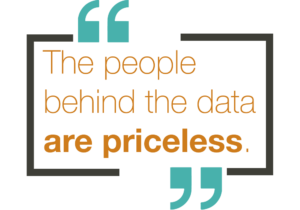
What is Cybersecurity?
What is cybersecurity, and why does it matter? The answer boils down to this: it’s a commitment to ensuring that the trust placed in your business by your clientele is warranted, understood, and treated as the precious commodity it is. It is a commitment to the understanding that you will do everything in your power to protect your clients from those who would do them harm, and that you will use their data in ways that are not exploitative. Let’s discuss the value of data in today’s world and why it needs to be protected.
What is the Value of Data?
In today’s world, the thing we place the most value on isn’t tangible – it’s information. Whether that information is the set of plans that allows Intel to build its latest chip, the numbers that identify you specifically and thus offer the keys to your life (Driver’s License number, Social Security number, Medicare ID number, passport number, etc.), the information obtained from apps, the numbers of your bank account, or your shopping preferences – information has now become a valuable commodity to those who understand its use.
Malicious hackers don’t stop at personal data though. There are other important bits of data out there: military secrets, corporate secrets, personal secrets, and computer code that represents fundamental operating parameters of some of the largest systems humanity has created. If these systems are breached, malicious hackers could shut down entire cities and even entire countries.
But it’s also important to recognize that data doesn’t have to be a secret to have value: company operating budgets, general internal contracting documentation, non-secret strategic agreements, even just operating metrics all have value to an organization, and ransomware targeting that type of information can bring a company to its knees.
Because data is so multifaceted, malicious hackers have a plethora of opportunities to wreak havoc on our organizations and communities. Data is a hot commodity and hackers are more opportunistic than ever before. So, why should it be protected?
Why Should Data Be Protected?
When something has value, it must, by extension, be protected. It stands to reason, then, that items of extraordinary value should be protected by extraordinary measures. Cybersecurity is that branch of security discipline devoted to protecting data and thus represents the line of defense we place to protect data from malfeasance, destruction, theft, or vandalism.
 Because data is viewed as difficult to understand, a blind trust that data is managed well by people that know better than us has continued to persist. This attitude toward privacy and security has cultivated a culture that allows malicious hackers to thrive and has established a place where security is only considered after the theft occurs. But things are looking up: improvements in protecting data are coming. A focus on cybersecurity that includes holding the owners of data responsible for its protection, improved regulation, and better understanding among the general public have started to transform the space into something far more manageable and comprehensible. Organizations are beginning to understand the true importance of protecting the value of the data that they are collecting, storing, and using. The people behind that data are priceless.
Because data is viewed as difficult to understand, a blind trust that data is managed well by people that know better than us has continued to persist. This attitude toward privacy and security has cultivated a culture that allows malicious hackers to thrive and has established a place where security is only considered after the theft occurs. But things are looking up: improvements in protecting data are coming. A focus on cybersecurity that includes holding the owners of data responsible for its protection, improved regulation, and better understanding among the general public have started to transform the space into something far more manageable and comprehensible. Organizations are beginning to understand the true importance of protecting the value of the data that they are collecting, storing, and using. The people behind that data are priceless.
During an age when information and data fuels businesses, understanding the value of cybersecurity in protecting data is crucial. Cybersecurity protects your privacy, identify, life, and future. It protects governments and militaries, preserves the lives of aid workers, keeps secret what should be secret, and ensures the companies you work for can continue to operate. In this world of shared information and interconnected systems, the fundamentals of cybersecurity grant us the ability to trust each other.
In today’s threat landscape, cybersecurity shouldn’t be taken lightly. Are you ready to begin protecting your consumers’ data? Are you interested in learning more about how to lead and implement a cybersecurity initiative at your organization? Contact us today for more information.
About Shannon Lane
Shannon Lane has over 20 years of experience in information services, including healthcare IT, e-commerce data extrapolation, network administration, database administration, and external audit work. Lane now serves as a Lead Practitioner at KirkpatrickPrice, represents KirkpatrickPrice on the 2018 HITRUST CSF Assessor Council, and holds CISSP, CISA, QSA, MSDBA, and CCSFP certifications.
More Cybersecurity Resources
Top Cybersecurity Trends for 2018
When Will It Happen to You: Top Cybersecurity Attacks You Could Face
Getting Executives on Board with Information Security Needs
How to Lead a Cybersecurity Initiative